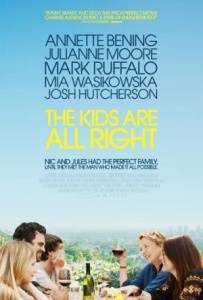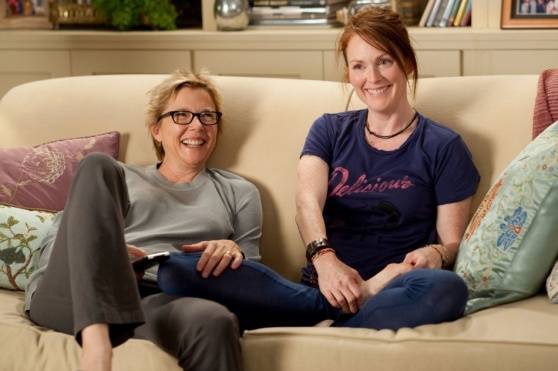 The UP Center of Champaign County is holding its 2nd Annual LGBTQA Film Festival this Saturday afternoon and evening at the Art Theater to celebrate Pride Month. A list of films, show times, and other details are available on the Facebook page for the event.
The UP Center of Champaign County is holding its 2nd Annual LGBTQA Film Festival this Saturday afternoon and evening at the Art Theater to celebrate Pride Month. A list of films, show times, and other details are available on the Facebook page for the event.
One of the films being shown at the festival is The Kids Are All Right, which was released last year, and was nominated for four Oscar Awards. The film was directed and co-written by Lisa Cholodenko. I’ve seen it described as a “dramedy,” and that’s about right.
The plot: Annette Benning and Julianne Moore play a lesbian couple (Nic and Jules, respectively) with two teenage children ― a boy (Laser) and a girl (Joni). The two moms each gave birth to one of the children using the same anonymous sperm donor. As many adoption agencies do, when Joni turns 18, they give her the option of learning the identity of the sperm donor. Joni, and especially Laser, want to know, and they quickly locate and meet their biological father. After a bit of an awkward start, the sperm donor ― whose name turns out to be Paul ― becomes close to the family and that’s when things get, well, complicated.
I liked this film and recommend it. It’s fast, funny, and gave me a chance to watch Annette Benning in another major role (I loved her performance in American Beauty).
Because I was interested in what she had to say, I asked LGBT activist, Smile Politely editor, and all-around humanities super-smarty Tracy Nectoux to share some of her thoughts about the film.
~~*~~

Mark: The plot centers around a non-traditional family, but many of the problems the parents face ― their teenage son hangs out with a friend they feel is a bad influence, for instance ― are problems that parents of all flavors encounter. At the end of the day, do you feel this is simply a family film about a family where the parents happen to be lesbian, or is the parents’ sexuality really the predominant issue in the film?
Tracy: There are definitely three types of issues and drama happening within this family, and you’re right about some of them being “typical family problems.” Some are similar to any average family, but there is one that is not:
- Nic and Jules are dealing with what most parents (straight or gay) have to deal with: worrying about bad influences on their son; pride mixed with mourning as their daughter grows up and leaves for college.
- They’re also dealing with a complication that a lot of adoptive parents (again, gay or straight) have to navigate: their children’s curiosity about their biological parent.
- And finally, they’re dealing with infidelity, but this time it’s not at all similar to what straight couples go through (if both of them are straight, of course), because Jules doesn’t cheat on Nic with another woman, but rather a man, which brings about an entirely different kind of betrayal for Nic. This is where the “not your average family drama” element is apparent.
Mark: The sperm donor, Paul, at the start of the film comes across as a Joe Casual without a care in the world. He’s got a successful career in a hip field; he’s enjoying a fling with a gorgeous and non-demanding younger woman; and he doesn’t appear to be looking to make any big commitments or changes. Yet, by the end of the film, he’s been emotionally mangled by his new relationship with the women he donated sperm to and their children and is seriously questioning what he’s doing with his life. He’s basically become an unhappy stalker.
I had mixed feelings about Paul. I thought it was largely his own carelessness that caused things to turn sour for him, yet I felt bad for him when they did. What did you think about him?
Tracy: I definitely agree with you that all of Paul’s problems are brought on by his own actions. What he did to Joni and Laser is inexcusable and, for them, unforgivable. He almost broke up their home. He led them to believe that he wanted to be a part of their lives (and I think that he sincerely did), and yet he risked being the catalyst for a divorce in their family.
But I try to remember that Paul never saw this coming. He never expected to know his kids. They aren’t his kids, really. They blindsided him. So when he hooked up with Jules, he wasn’t thinking as a father at all, because he’s not a father. So there’s that. But that being said, what he did to those kids was thoughtless and harmful, and it would have been thoughtless and harmful to any kids, his own or not.
So I think that Paul is a good guy who did a thoughtless thing, that had the potential to lead to something horrible. The main reason that I don’t like Paul, however, isn’t because he had an affair with Jules (who wouldn’t?), but because in the final scene, when he catches Laser’s eye, he gives him a look like, “Well, yeah, this sucks, but you understand, right?” That’s why I don’t like Paul. He undermined Laser’s mom and then tried to get Laser to do the same.

Mark: The film was offensive to some lesbians because one of the moms ― although she’s been in a committed relationship with her partner for years ― has an affair with a man. The feeling was that the cliché of lesbians not really preferring women and really wanting to have sex with men, as well as the tired plot device of a woman in a lesbian relationship having an affair with a guy were being hauled out yet again.
However, director and co-writer Lisa Cholodenko is lesbian herself and gave birth to her son using an anonymous sperm donor, so she can’t be accused of not knowing what she’s talking about, or of wanting to discredit or belittle lesbians. What are your thoughts on this whole plot angle in the film?
Tracy: Oh boy, do I have thoughts! Lesbians are going to be sensitive about this because Hollywood has a long, sordid history of portraying them exactly how you just described it (and you described it really well). Whether or not that’s happening in this film can be debated, but I do know where their concerns about this are coming from. And they’re legitimate concerns.
But Jules is not strictly a lesbian. Jules is a lesbian-identified woman who sleeps with a man. This is not a new phenomenon. And this is not limited to women only; however, with men it’s most often reversed: straight-identified men do sometimes seek out sexual encounters with other men. Just give Craig’s List a look.
My kneejerk reaction to this film was typical of women like me: “She’s bi! She’s bi! Look at this! She’s in love with a woman and she’s fucking a man! She’s bi! Why won’t they say it! Why won’t they say it!” I’ve thought about it a lot, and I don’t know why they won’t “say it.” When Nic discovers Jules’ affair, she asks: “Are you straight now?” Why are the only options for Jules either gay or straight? And why would a lesbian imply that sexuality is a choice at all?
Also, when Paul is trying to get Jules to leave Nic for him, she says, “I’m gay,” and dumps him flat. We all saw the sex scenes between Paul and Jules. For Jules to sleep with Paul as much as she did, and to enjoy it as much as she did, and then say, “I’m gay,” was, I admit, frustrating to me. Jules may prefer women to men, but ― from what I could tell ― she’s not gay. And for me, that’s where Cholodenko drops the ball: her message that bisexuality isn’t an option for Jules. And that’s not just an insult to bisexuals but to lesbians as well. I’ve only seen this film once, and it’s been a long time, but I don’t remember the word “bisexual” coming up even once. The word “bisexual” is out of fashion, alas.
That being said, if I was a lesbian, I wouldn’t have a problem with this film, because I don’t consider Jules to be a lesbian or a representative of lesbians. To me, she’s a bisexual woman who self-identifies as lesbian. There are many bisexual women who do this. And there are many bisexual women who self-identify as straight, as well. Women’s sexual fluidity is complicated and beautiful and mysterious. Dan Savage says that we have “super powers,” and I love that!
This topic is sensitive and nuanced, and in no way am I setting myself up as an expert on it. I hope that if I’ve said something wrong or ignorant here that someone who knows more will call me on it.
Mark: For me, the strongest scene in the movie is after Nic finds Jules’ hair in the shower drain at Paul’s house. There’s a close up of her face after she sits back down at the dinner table, and the sound of the film does weird things as she processes what she’s just figured out. It’s a very tense 20 seconds or so. What scene(s) stayed with you?
Tracy: I remember that scene. You can hear her swallow her wine. Benning should have won the Oscar for Best Actress based on that scene alone. She was robbed.
What I love most about this film is that, through all the misery, Nic and Jules never considered breaking up. Nic didn’t move out. She never told Jules to get out. There was never a moment where we were led to believe that they’d break up. I loved Jules’ apology to her family ― she apologized to not just Nic but to the kids as well. And I loved “Maybe if I read more Russian novels.” That made me laugh.
So it probably won’t surprise you that the scene that sticks with me is the final one, where ― after they’ve dropped Joni off at college ― Jules reaches over and takes Nic’s hand, and Nic lets her. So much said there, by both of them, in that one small gesture.
 Mark: Initially, Joni thinks it’s a bad idea to look up the family’s sperm donor. She only does so because Laser convinces her to. A lot of drama happens once Joni contacts Paul and he becomes involved, and all four people in the family end up saying and doing some really hateful stuff to one another.
Mark: Initially, Joni thinks it’s a bad idea to look up the family’s sperm donor. She only does so because Laser convinces her to. A lot of drama happens once Joni contacts Paul and he becomes involved, and all four people in the family end up saying and doing some really hateful stuff to one another.
However, there’s a very upbeat ending considering all that’s happened. Do you see the ending as overly simplistic ― there have been a lot of lines crossed, especially by Jules ― or is it plausible?
Tracy: As you can probably tell, I’m answering these as I go along, so this question is funny considering my previous answer!
The scene that I mentioned earlier between Paul and Laser is even more poignant, considering that it was Laser who fought so hard to find Paul in the first place. Thank you for reminding me about that.
I’m not sure that I’d describe the ending as upbeat. Yes, Jules and Nic are holding hands, and yes they’re recommitting themselves to each other, but they’re cautious. And they’re not smiling. It’s more relief on both their parts that it’ll work out. And hope.
One of the things that many lesbians don’t like about this film is the portrayal of the Lesbian Bed Death myth. But Nic and Jules’ marriage survived the affair mainly because their marriage wasn’t “all about the sex.” Sex with Paul never led Jules to fall in love with him, or to have any feelings for him at all. Remember how coldly she dumped him. At first, we think that the lack of sex in the marriage ― the lack of excitement in general ― is what contributed to Jules’ affair with Paul. But I don’t think that’s it. Remember why she told Nic she slept with Paul: she felt “appreciated” by him. And I think that Nic understands this. I think this is why she doesn’t even think of leaving Jules. What she needed from Jules is exactly what she got: assurance that Jules didn’t love Paul and a recommitment to their marriage.
So, because sex isn’t a huge, important part of their marriage, Nic didn’t let sex break them up. That’s very plausible to me and it’s not simplistic at all. The simplistic thing to do would have been to break up.
Mark: Any other thoughts or observations?
Tracy: I highly recommend this film. It’s well written and brilliantly acted. I know its brutal honesty makes a lot of people uncomfortable and even angry. No one likes a mirror held up to their nature or culture. I know I don’t. But we submit to it all the time for art, and though The Kids Are All Right isn’t Shakespeare (or even American Beauty), it’s the best of the films (in a list of strong films) offered at this festival. And, if anything, it’s bound to spark lively conversation.
Thank you for asking me to interview. And for calling me super-smarty!
Trailer:
All stills from the film’s official website.








